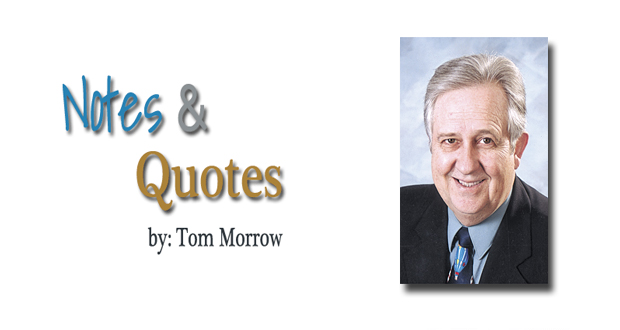Harry Truman – His ‘Accidentcy’
By Tom Morrow
Harry S. Truman was elected Franklin Roosvelt’s vice president in the election of 1944. He took office in January of 1945 – less than three months later FDR was dead and Truman was moved into the White House. Among his detractors behind his back, Truman was known as “His Accidentcy.”
He started his political career as a Missouri county judge (supervisor) and because of questionable support from a Kansas City political boss, there always was a bit of a cloud over his head. In 1935, Truman ascended to the U.S. Senate and a decade later he found himself in the White House.
Truman’s background is rich in history – too much for this small space. There are six major points to know about this Missouri farmer.
- He was a captain of a U.S. Army field artillery unit during World War I
- His first success in elective office as a county judge.
- His momentous decision to drop the atom bomb ending World War II.
- His organizational skills in feeding Europe and forming the North Atlantic Treaty Organization (NATO).
- He authorized the troop commitment in the Korean war.
- He introduced civil rights and integrated the Armed Forces.

Truman probably wouldn’t have succeeded had it not been for the financial backing, advice and encouragement of KC political boss Tom Pendergast. There’s no indication he ever accepted anything but above-board advice and financial support for campaigning. Still, his friendship with the Kansas City boss followed Truman right into the White House.
Elected a Jackson County judge in 1922, Truman had the responsibility of letting bids to contractors, not the least of which were paving companies. Pendergast owned a paving company and expected his friend to give him the nod. When Truman issued the contract to another company, Pendergast wanted an explanation.
“Your roads fall apart because of shoddy work,” Truman replied. “Farmers need market roads they can depend on.”
It wouldn’t be the only time Truman served as a watchdog for the taxpayer.
Born May 8, 1884, Harry S. Truman was the 33rd president of the United States from 1945 to 1953, succeeding office upon the death of Franklin D. Roosevelt. He was vice president for not quite three months (FDR died April 12 1945).
Truman grew up in Independence, Missouri, and during World War I, he was sent to France as a captain in the Field Artillery. Returning home, he opened a haberdashery in Kansas City and was later elected as a Jackson County official. Truman was elected to the U.S. Senate from Missouri in 1934 and gained national prominence as chairman of the Truman Senate Committee aimed at reducing industrial waste and inefficiency in the early days of World War II. He caused havoc among armament manufacturers, exposing wasteful spending and shoddy production of weapons and vehicles.
After their election, there’s only one recorded meeting between FDR and Truman. When he assumed the presidency, unaware of its existence, Truman was advised of the secret atom bomb, which was ready to be tested and used. He was told dropping the bomb could save up to 1 million American and Japanese lives. In deliberate fashion, Truman authorized the first and only use of nuclear weapons in war. It ended World War II. 
After the onset of the Cold War in 1948, Truman oversaw the Berlin Airlift and Marshall Plan to feed war-ravished Europe. When North Korea invaded South Korea in 1950, he gained United Nations approval to intervene in what became known as the Korean War.
In 1948, Truman submitted the first comprehensive civil rights legislation to start racial integration in the military and federal agencies.
In 1948, Truman shocked the nation by winning the White House in his own right. He dealt with a lot of domestic problems, not the least of which was a national railroad strike.
After Republican Dwight D. Eisenhower’s electoral victory, Truman left office personally broke. He always maintained: “If a politician leaves office richer than he was going in, there’s something very wrong.” There was no pension for former presidents. Reportedly, Eisenhower pushed Congress to address that problem, creating a presidential pension.
This is only a thumbnail sketch of Truman’s life. He was a poor farm boy with only a high school education, but he was wise beyond his years. He wasn’t afraid to make a decision, Truman had a slogan sitting on his desk that read: “The Buck Stops Here.”
The turmoil that has surrounded the White House over the past three decades have left a lot of pundits and taxpayers lamenting: “Where’s Harry when we need him?”
One of the best biographies is “Truman,” by David McCullough, who won a Pulitzer Prize for his 1,400-plus page tome, which is still available on Amazon.com.




